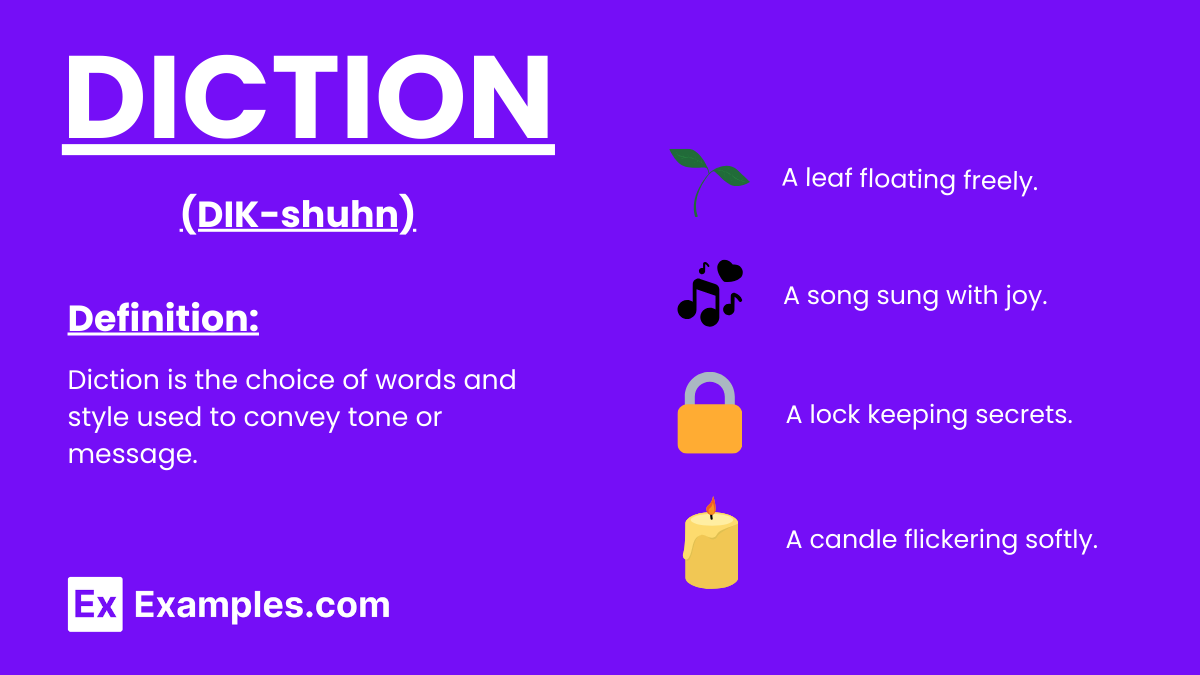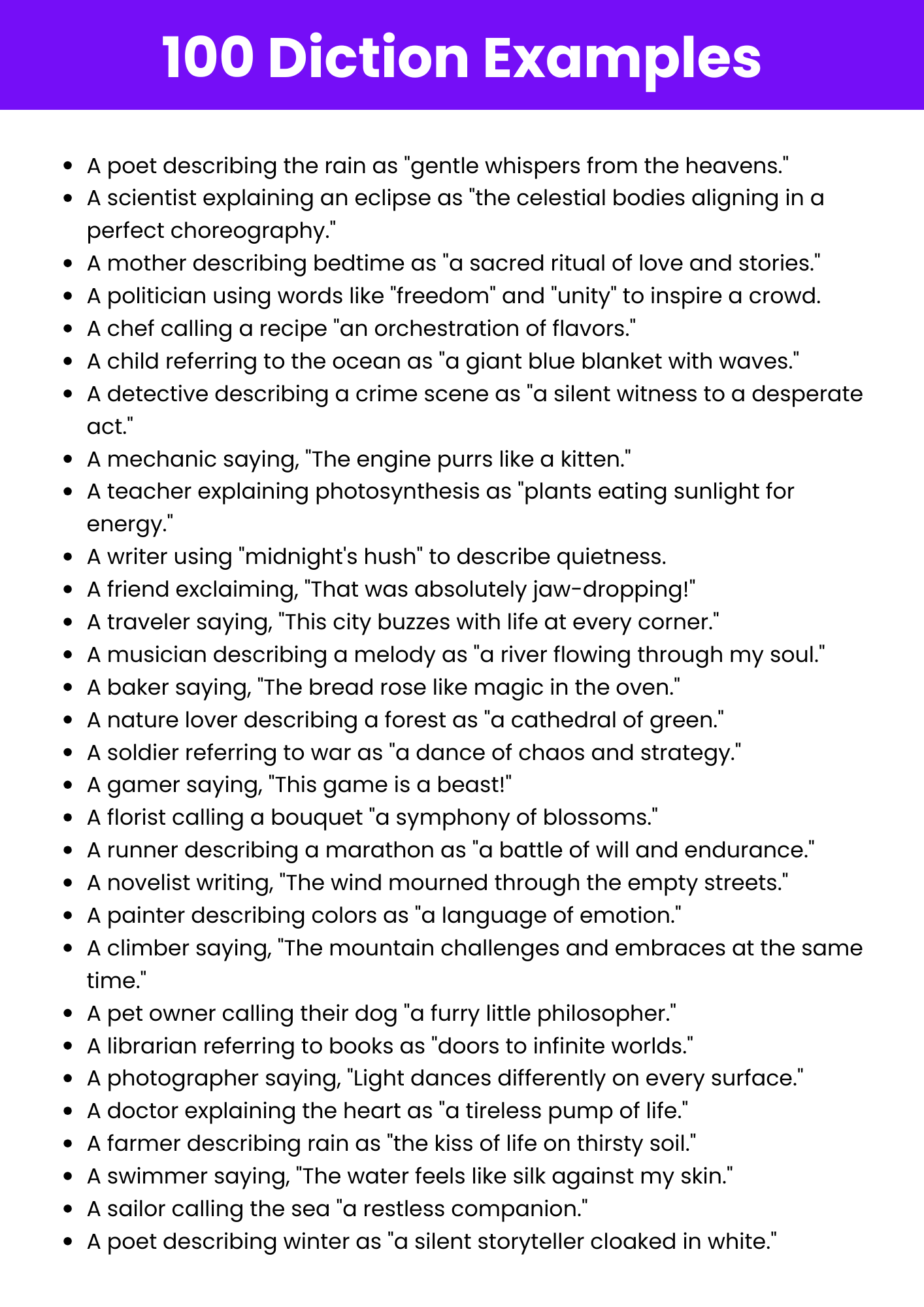Diction
What is Diction? – Definition
Diction refers to the choice and use of words in speech or writing, shaping the tone, style, and meaning of a text or conversation to effectively convey ideas or emotions.

Generated Diction Examples

Examples of Diction
- Formal: “We request your presence at the annual meeting.”
- Informal: “Hey, what’s going on?”
- Colloquial: “Y’all better hurry up.”
- Poetic: “The golden sun kissed the earth goodbye.”
- Abstract: “Love is the essence of life.”
- Concrete: “The red apple was sweet and crisp.”
- Persuasive: “Act now to save the planet.”
- Descriptive: “The room smelled of fresh paint and lemon polish.”
- Neutral: “The train departs at 6 PM.”
- Slang: “That party was legit awesome!”
- Technical: “The patient displayed symptoms of arrhythmia.”
- Jargon: “Let’s circle back on this project later.”
- Euphemistic: “He passed away peacefully.”
- Sarcastic: “Oh, great, another rainy day.”
- Ironical: “What a perfect day to forget my umbrella!”
- Regional: “I’m fixin’ to make dinner.”
- Sensory: “The chocolate melted smoothly on my tongue.”
- Simple: “The dog barked loudly.”
- Complex: “The canine expressed its displeasure vociferously.”
- Direct: “I am going to the park.”
- Subtle: “The park seemed to invite visitors with open arms.”
- Positive: “The garden bloomed with vibrant flowers.”
- Negative: “The neglected garden was overrun with weeds.”
- Academic: “This study elucidates the principles of quantum mechanics.”
- Casual: “Let’s grab a burger later.”
- Exaggerated: “I’ve told you a million times to clean your room!”
- Optimistic: “Tomorrow holds endless possibilities.”
- Pessimistic: “Nothing ever goes right for me.”
- Literal: “The cat sat on the mat.”
- Figurative: “The cat was the queen of the household.”
Types of Diction
Formal Diction
The use of sophisticated and professional language, often in official or academic settings.
- “We cordially invite you to the annual gala.”
- “The results of the study indicate a significant correlation.”
- “Your participation is greatly appreciated.”
- “The decision has been made after thorough deliberation.”
- “The meeting will commence promptly at 10 AM.”
Informal Diction
Casual and conversational language, often used in everyday interactions.
- “Hey, what’s up?”
- “I’m just chillin’ at home.”
- “Wanna grab some coffee later?”
- “That movie was awesome!”
- “I don’t know, let’s figure it out.”
- “Let’s hang out this weekend.”
- “This place is so chill!”
Poetic Diction
Language that is rich in imagery, figurative expressions, and rhythm, often used in poetry.
- “The golden sun sank below the horizon.”
- “The whispering wind caressed the ancient trees.”
- “A thousand stars lit up the velvet sky.”
- “The river danced with joy as it met the sea.”
- “The moon shed tears of silver on the earth.”
Colloquial Diction
Language that uses regional expressions or everyday slang for casual communication.
- “Y’all are coming to the party, right?”
- “That idea is pretty dope!”
- “I reckon we should head out now.”
- “She’s fixin’ to cook dinner.”
- “This ain’t what I signed up for.”
Abstract Diction
Language that focuses on intangible concepts or ideas, often philosophical or theoretical.
- “Freedom is the essence of life.”
- “The beauty of love transcends all boundaries.”
- “Happiness is a fleeting state of mind.”
- “Justice must prevail to ensure harmony.”
- “Courage is the foundation of great achievements.”
Concrete Diction
Language that uses specific, tangible details or descriptions to create vivid imagery.
- “The red apple glistened under the morning sun.”
- “The cold, rough texture of the granite was unmistakable.”
- “She wore a blue dress with white polka dots.”
- “The aroma of freshly brewed coffee filled the room.”
- “The wooden floor creaked under his heavy footsteps.”
How to Identify and Understand Diction?
Identifying diction involves analyzing the choice of words and how they contribute to the tone, style, and meaning of a text.
- Examine the word choices used by the author in the text.
- Note whether the language is formal, informal, poetic, or colloquial.
- Understand how diction sets the tone or mood of the text.
- Identify patterns in word choice, such as repetition, metaphors, or technical terms.
- Analyze how diction affects the imagery and emotional impact of the text.
How to Use Diction Effectively?
Using diction effectively involves selecting words that match the purpose, audience, and desired tone of your writing.
- Choose words that align with the context and intention of your writing.
- Use precise and vivid language to convey your ideas clearly.
- Match your diction to the audience, using formal or informal language as appropriate.
- Incorporate descriptive words to create strong imagery and engage readers.
- Vary your diction to enhance rhythm, tone, and emotional depth in your writing.
Other Examples of Dictions
Neutral Diction
Plain and factual language without emotional or figurative elements.
- “The sun rises in the east.”
- “The meeting is scheduled for 2 PM.”
- “The box measures 10 inches by 12 inches.”
- “The temperature outside is 25 degrees Celsius.”
- “This task is due by the end of the day.”
Euphemistic Diction
Polite or mild expressions used to avoid harsh or unpleasant language.
- “He passed away peacefully.”
- “They are downsizing the company.”
- “She’s in between jobs right now.”
- “The procedure will cause some discomfort.”
- “We had to put the dog to sleep.”
Sensory Diction
Language that appeals to the five senses to create vivid imagery.
- “The roses smelled sweet and fresh.”
- “The soup tasted rich and creamy.”
- “The melody was soft and soothing.”
- “The thunder clapped loudly, shaking the windows.”
- “The sky turned a deep shade of crimson.”
Colloquial Diction
Language that uses everyday expressions or slang commonly spoken in specific regions.
- “Y’all better hurry up.”
- “That idea is pretty dope!”
- “I reckon we should head out now.”
- “She’s fixin’ to cook dinner.”
- “This ain’t what I signed up for.”
Figurative Diction
Creative language that uses figures of speech like metaphors or similes.
- “Her smile was as bright as the sun.”
- “The stars danced across the night sky.”
- “The painting spoke of a thousand emotions.”
- “The wind whispered secrets through the trees.”
- “Her anger burned like a wildfire.”
Technical Diction
Precise language used in specific fields or professions.
- “The patient exhibited symptoms of arrhythmia.”
- “The structure is reinforced with carbon steel.”
- “The blueprint outlines the building’s design.”
- “The program uses a recursive algorithm.”
- “The diagnosis was confirmed through imaging tests.”
Explore Other Literary Devices
Elevate Your AP English Preparation
Unlock your potential with our comprehensive AP English exam preparation tools designed to help you excel.
- Extensive Question Bank: Access 900+ exam-like questions for both AP English Language and Literature.
- Expertly Crafted: Questions mirror the structure and difficulty of actual AP exams, ensuring relevant practice.
- Detailed Explanations: Understand your mistakes with clear, concise breakdowns of correct and incorrect answers.
- Personalized Learning: Tailor your study sessions with topic-specific tests and adaptive learning tools.
- Comprehensive Coverage: Master all aspects of the AP English curriculum with extensive guides and resources.
Frequently Asked Questions
-
What is diction?
Diction refers to the choice of words and style of expression used by an author or speaker to convey a specific tone or message. -
Why is diction important in writing?
Diction is crucial because it sets the tone, conveys the intended message, and influences how readers perceive and connect with the content. -
What are the types of diction?
Types of diction include formal, informal, neutral, colloquial, figurative, technical, and sensory diction, each serving a specific purpose. -
How does diction differ from tone?
Diction refers to word choice and phrasing, while tone is the attitude or emotion conveyed through those choices. -
What is the difference between formal and informal diction?
Formal diction uses sophisticated, professional language, while informal diction is conversational and casual, often including slang or colloquialisms. -
How can diction affect the tone of a text?
Diction directly shapes tone; for example, formal diction conveys seriousness, while informal diction can create a friendly or humorous tone. -
Can diction be used to create imagery?
Yes, sensory diction involves descriptive words that appeal to the five senses, creating vivid imagery in the reader’s mind. -
How does diction vary between different audiences?
Diction varies to match the audience; for example, technical diction suits professionals, while casual diction is more appropriate for informal readers. -
How can writers improve their diction?
Writers can improve diction by expanding their vocabulary, understanding their audience, and practicing precise, purposeful word choices. -
What role does diction play in poetry?
In poetry, diction is used to evoke emotions, enhance rhythm, and convey deeper meanings through carefully chosen words.

